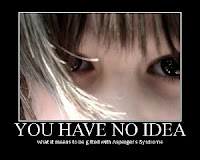This is not really that topical, but I was watching the film Moonstruck on the plane. There are two pieces of dialogue I had forgotten about. The one-handed Nicholas Cage character explains to Cher how he lost his hand:
RONNY
It's wood. It's fake. Five years ago
I was engaged to be married. Johnny
came in here, he ordered bread from
me. I put it in the slicer and I
talked with him and my hand got caught
cause I wasn't paying attention. The
slicer chewed off my hand. It's funny
'cause - when my fiancé saw that I
was maimed, she left me for another
man.
LORETTA
That's the bad blood between you and
Johnny?
RONNY
That's it.
LORETTA
But that wasn't Johnny's fault.
RONNY
I don't care! I ain't no freakin
monument to justice! I lost my hand,
I lost my bride! Johnny has his hand,
Johnny has his bride! You come in
here and you want me to put away my
heartbreak and forget?
Later she tells him what she thinks of him:
LORETTA
The big part of you has no words and
it's-a wolf. This woman was a trap
for you. She caught you and you could
not get away.
(She grabs his wooden
hand)
So you chewed off your foot! That
was the price you had to pay to be
free.
(throws his hand down)
Johnny had nothing to do with it.
You did what you had to do, between
you and you, and I know I'm right, I
don't care what you say. And now
you're afraid because you found out
the big part of you is a wolf that
has the courage to bite off its own
hand to save itself from the trap of
the wrong love. That's why there has
been no woman since that wrong woman.
You are scared to death what the
wolf will do if you make that mistake
again!
Later he tells her what's up with her life:
RONNY
And what do you know? You tell me my
life? I'll tell you yours. I'm a
wolf? You run to the wolf in me,
that don't make you no lamb! You're
gonna marry my brother? Why you wanna
sell your life short? Playing it
safe is just about the most dangerous
thing a woman like you could do. You
waited for the right man the first
time, why didn't you wait for the
right man again?
I thought this was such an interesting concept -- "playing it safe is just about the most dangerous thing a woman like you could do." I sometimes feel this way when I think about things that might be considered "playing it safe," like planning on being in a job for longer than three years, being in a committed relationship, otherwise locking myself into something, caging myself in or allowing myself to be caged. I realize it is actually a dangerous thing for a person like me to do. I realize that I probably won't be able to stay locked up like that forever and that when I finally try to extricate myself, there may be significant damage to myself and others.
It reminds me of the letter Amelia Earhart wrote to her husband George Putnam before they wed: "I may have to keep some place where I can go to be myself, now and then, for I cannot guarantee to endure at all times the confinement of even an attractive cage." And commenting on her own capriciousness in a letter to a friend, "I don't want anything, all the time." So true.
 A reader asks:
A reader asks:



















